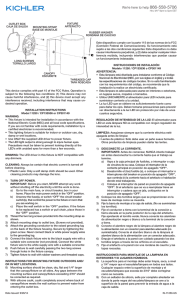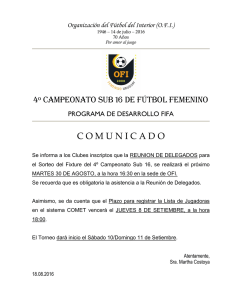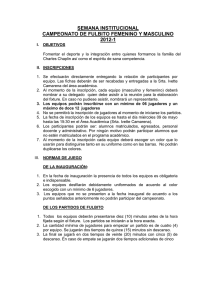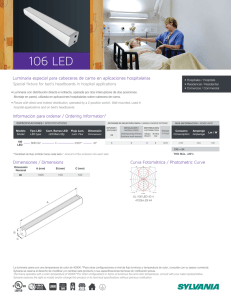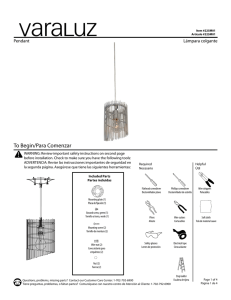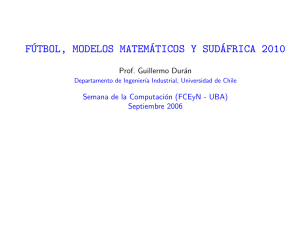LLE-B1-ST • LLE-D1-ST
Anuncio
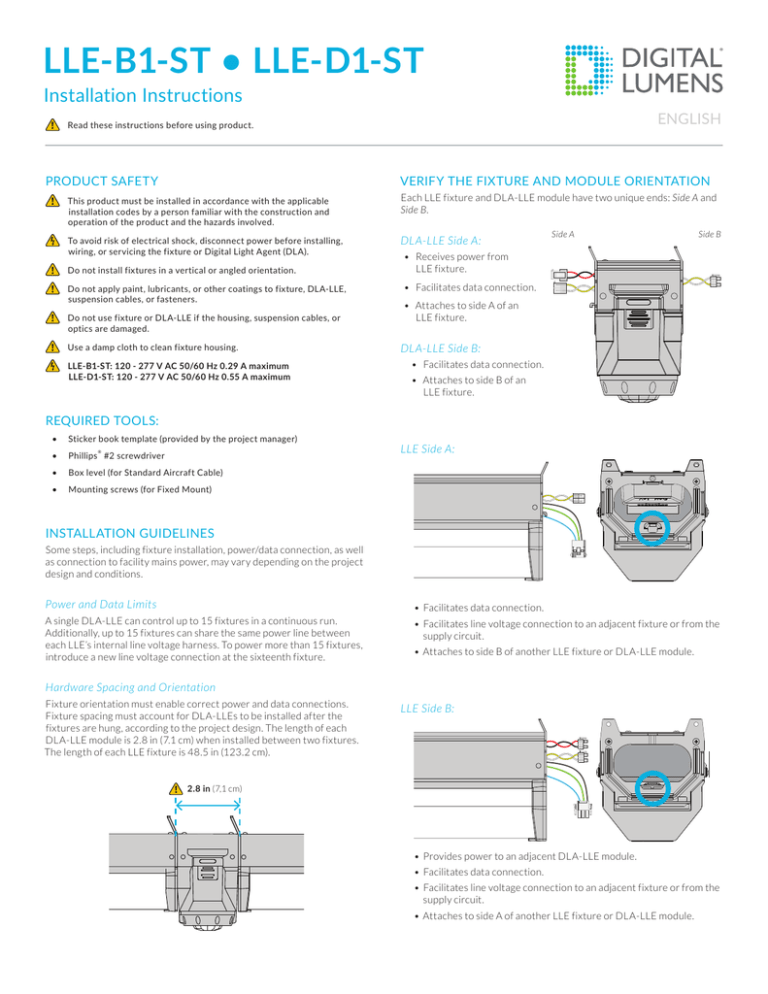
LLE-B1-ST • LLE-D1-ST Installation Instructions ENGLISH ! Read these instructions before using product. PRODUCT SAFETY VERIFY THE FIXTURE AND MODULE ORIENTATION ! This product must be installed in accordance with the applicable installation codes by a person familiar with the construction and operation of the product and the hazards involved. To avoid risk of electrical shock, disconnect power before installing, wiring, or servicing the fixture or Digital Light Agent (DLA). Each LLE fixture and DLA-LLE module have two unique ends: Side A and Side B. DLA-LLE Side A: ! Do not install fixtures in a vertical or angled orientation. • Receives power from LLE fixture. ! Do not apply paint, lubricants, or other coatings to fixture, DLA-LLE, • Facilitates data connection. ! Do not use fixture or DLA-LLE if the housing, suspension cables, or • Attaches to side A of an LLE fixture. suspension cables, or fasteners. optics are damaged. ! Use a damp cloth to clean fixture housing. LLE-B1-ST: 120 - 277 V AC 50/60 Hz 0.29 A maximum LLE-D1-ST: 120 - 277 V AC 50/60 Hz 0.55 A maximum Side A Side B DLA-LLE Side B: • Facilitates data connection. • Attaches to side B of an LLE fixture. REQUIRED TOOLS: • Sticker book template (provided by the project manager) • Phillips #2 screwdriver • Box level (for Standard Aircraft Cable) • Mounting screws (for Fixed Mount) ® LLE Side A: INSTALLATION GUIDELINES Some steps, including fixture installation, power/data connection, as well as connection to facility mains power, may vary depending on the project design and conditions. Power and Data Limits • Facilitates data connection. A single DLA-LLE can control up to 15 fixtures in a continuous run. Additionally, up to 15 fixtures can share the same power line between each LLE’s internal line voltage harness. To power more than 15 fixtures, introduce a new line voltage connection at the sixteenth fixture. • Facilitates line voltage connection to an adjacent fixture or from the supply circuit. • Attaches to side B of another LLE fixture or DLA-LLE module. Hardware Spacing and Orientation Fixture orientation must enable correct power and data connections. Fixture spacing must account for DLA-LLEs to be installed after the fixtures are hung, according to the project design. The length of each DLA-LLE module is 2.8 in (7.1 cm) when installed between two fixtures. The length of each LLE fixture is 48.5 in (123.2 cm). LLE Side B: ! 2.8 in (7,1 cm) • Provides power to an adjacent DLA-LLE module. • Facilitates data connection. • Facilitates line voltage connection to an adjacent fixture or from the supply circuit. • Attaches to side A of another LLE fixture or DLA-LLE module. ADD TRACKING LABELS TO THE STICKER BOOK 1. Detach the plastic bag from the DLA-LLE module containing the barcode label. 2. Affix the barcode label to the sticker book in accordance with the physical location of the DLA-LLE module in the facility. 3. Repeat for each DLA-LLE module and its assigned fixture run. Note: Ensure that you have labeled each fixture run clearly as this information is necessary for wiring and data configuration. Suspension Cable to Beam/Truss Sticker Book 3. Attach the spring clips to the fixture using the designated holes. INSTALL THE FIXTURES There are two hanging methods: Fixed Mount and Standard Aircraft Cable. Note: Leave 2.8 in (7.1 cm) between fixtures where DLA-LLE modules will be installed, according to the project design. Fixed Mount (to surface or unistrut): 4. Hook the suspension cables to the spring clips. 1. Refer to the sticker book to confirm the correct location of the fixture. 5. Use a box level to level the fixture. 2. Install both mounting brackets so that they will be equidistant from the center of the fixture, leaving 39.375 ± .375 in (100.1 ± 1.0 cm) between brackets. ! Note maximum cable angle. 39.375 in ± .375 in 100,0 cm ± 1,0 cm 3. Secure the fixture to the mounting brackets through the designated handles so that the hardware snaps into place. ! 60° max. MAKE POWER AND DATA CONNECTIONS Note: Before making data connections, refer to the sticker book or project plan to identify all assigned control groups. There must be one continuous data line between all fixtures assigned to the same DLA-LLE. Fixture to Fixture: CONTROL CONTROL Power (black/red) Alimentacion (negro/rojo) Data (yellow/white) Datos (amarillo/blanco) LINE POWER 4. Center the fixture, then use a Phillips ® #2 screwdriver and the provided locking screws to lock the fixture to the brackets. LÍNEA DE ALIMENTACIÓN Line (brown) Línea (marrón) Ground (green/yellow) Tierra (verde/amarillo) Neutral (blue) Neutro (azul) 1. In accordance with national, state and local electrical codes, gather the line power and control data (yellow/white) cables from each fixture and make the appropriate connections. Fixed Mount Locking Screws Standard Aircraft Cable: Note: Each fixture requires at least two suspension cables, two cable fasteners, and two Gripple ® spring clips. 1. Refer to the sticker book to confirm the correct location of the fixture. 2. Secure the suspension cables to a beam or truss. 2 Note: Control power (black/red) cables provide power from a fixture to a DLA-LLE module. If no DLA-LLE is present, tuck the cables into the fixture. 2. Once the power and data lines are connected, hook the tab on Side A of the fixture onto Side B of the next fixture. Side A Side B 3. Using a Phillips ® #2 screwdriver, secure the endplates together with the provided screws. 4. Connect all fixtures and DLA-LLE modules in a fixture run. Make any necessary knockouts and secure cover plates to fixtures or modules on either end of the fixture run. Fixture to DLA-LLE (to Fixture): Note: A continuous data bus is required for all fixtures in a DLA-LLE control group. Familiarize yourself with the project design to avoid connecting one fixture to multiple DLA-LLEs. 3. Once all connections are made, hook the tab on Side A of the DLA-LLE onto Side B of the adjacent fixture. Side A Side B 4. Using a Phillips ® #2 screwdriver, secure the endplates together with the provided screws. 5. Connect all fixtures and DLA-LLE modules in a fixture run. Make any necessary knockouts (see Connect to Facility Mains Power, page 8) and secure cover plates to fixtures or modules on either end of the fixture run. CONNECT TO FACILITY MAINS POWER Do not connect or disconnect while under load. CONTROL CONTROL Power (black/red) Alimentacion (negro/rojo) Data (yellow/white) Datos (amarillo/blanco) Knockout Locations: ½ inch trade size LINE POWER LÍNEA DE ALIMENTACIÓN Line (brown) Línea (marrón) Ground (green/yellow) Tierra (verde/amarillo) Neutral (blue) Neutro (azul) 1. If connecting line power between two fixtures: In accordance with national, state and local electrical codes, feed the line power cables from the first fixture through the DLA-LLE. Connect to the second fixture. LLE (Top View) Knockout Locations Cover Plate Knockout Locations To connect through knockout on top of fixture: 2. Refer to the project plan to verify the control assignments. Feed one control data (yellow/white) cable through each side of the DLA-LLE, and connect to the adjacent fixture(s). Then, feed the control power (black/red) cable to connect with the appropriate fixture. 1. Make the appropriate knockout, then use a Phillips ® #2 screwdriver to remove the (4x) screws to open the top of the fixture. 2. Identify the power lines that will attach to facility mains power and cut off the modular connector. 3 Cut modular connector 3. Feed the wires through the knockout and strain relief. 4. In accordance with national, state, and local electrical codes, connect to facility mains power. 5. Replace the fixture top and screws. To connect through knockout on cover plate: 1. Identify the power lines that will attach to facility mains power and cut off the modular connector. 2. Feed the wires through the knockout and strain relief. 3. In accordance with national, state, and local electrical code, connect to facility mains power. 4. Attach the cover plate by inserting the two bottom tabs to the fixture. 5. Using a Phillips ® #2 screwdriver and the provided screws, screw the cover plate to the fixture. VERIFY THE STICKER BOOK To prevent issues during commissioning, ensure that the placement of the bar code label in the sticker book corresponds to the DLA-LLE’s physical location in the facility and that the corresponding fixture runs are identified. 4 LLE-B1-ST • LLE-D1-ST Instrucciones de instalación ESPAÑOL ! Lea las instrucciones antes de usar el producto. SEGURIDAD DEL PRODUCTO ! Este producto se debe instalar conforme al código de instalación correspondiente y dicha instalación debe estar a cargo de una persona familiarizada con la construcción y la operación del producto y los riesgos involucrados. Para evitar descargas eléctricas, desconecte la alimentación antes de instalar, cablear o realizar tareas de mantenimiento en el dispositivo o el Digital Light Agent (agente de luz digital, DLA). ! No instale los dispositivos en posición vertical o en ángulo. VERIFICAR LA ORIENTACIÓN DEL DISPOSITIVO Y DEL MÓDULO Los dispositivos LLE y los módulos DLA-LLE tienen cada uno dos extremos únicos, el lado A y el lado B. Lado A del DLA-LLE: • Facilita la conexión de datos. ! No use el dispositivo o el DLA-LLE si la carcasa, los cables de suspensión • Se conecta al lado A de otro dispositivo LLE. o la óptica están dañados. ! Use un paño húmedo para limpiar la carcasa del dispositivo. LLE-B1-ST: 120 - 277 V AC 50/60 Hz 0.29 A maximum LLE-D1-ST: 120 - 277 V AC 50/60 Hz 0.55 A maximum HERRAMIENTAS NECESARIAS • Plantilla del libro de etiquetas adhesivas (proporcionada por el director del proyecto) Lado B • Recibe alimentación del dispositivo LLE. ! No aplique pintura, lubricantes ni ningún otro recubrimiento al dispositivo, al DLA-LLE, a los cables de suspensión o a los sujetadores. Lado A Lado B del DLA-LLE: • Facilita la conexión de datos. • Se conecta al lado B de otro dispositivo LLE. Lado A del LLE: • Destornillador Phillips® n.º 2 • Caja niveladora (para el cable para aviación estándar) •Tornillos de montaje (si está colgado mediante un • montaje fijo) PAUTAS DE INSTALACIÓN Algunos pasos pueden variar según el diseño y las condiciones del proyecto (p. ej., la instalación de dispositivos, la conexión de los cables de datos y de alimentación, y la conexión a la red eléctrica en la ubicación física). • Facilita la conexión de datos. Límites de alimentación y datos • Se conecta al lado B de otro dispositivo LLE o módulo DLA-LLE. Un solo DLA-LLE puede controlar hasta 15 dispositivos que funcionen de forma continua. Además, hasta 15 dispositivos pueden compartir la misma línea de alimentación entre los cables de tensión de línea interna del LLE. Para suministrar alimentación a más de 15 dispositivos, instale una nueva conexión de tensión de línea en el decimosexto dispositivo. • Facilita la conexión de voltaje de línea a un dispositivo adyacente o desde el circuito de alimentación. Lado B del LLE: Orientación y espaciado del equipo físico La orientación del dispositivo debe permitir conectar correctamente los cables de alimentación y de datos. ! 2.8 in (7,1 cm) Para la separación de los dispositivos es importante tener en cuenta que, según el plan del proyecto, los módulos DLALLE se instalarán después de colgar los dispositivos. La longitud de cada módulo DLA-LLE es de 7,1 cm cuando se instala entre dos dispositivos. La longitud de cada dispositivo LLE es de 123,2 cm. • Suministra alimentación a un módulo DLA-LLE adyacente. • Facilita la conexión de datos. • Facilita la conexión de voltaje de línea a un dispositivo adyacente o desde el circuito de alimentación. • Se conecta al lado A de otro dispositivo LLE o módulo DLALLE. 5 AGREGAR LAS ETIQUETAS DE SEGUIMIENTO EN EL LIBRO DE ETIQUETAS ADHESIVAS 1. Retire la bolsa de plástico del módulo DLA-LLE que contiene la etiqueta del código de barras. Cable para aviación estándar: Nota: Cada dispositivo necesita, por lo menos, dos cables de suspensión, dos sujetadores de cable y dos abrazaderas de resorte Gripple ® . 1. Consulte el libro de etiquetas adhesivas para confirmar la ubicación correcta del dispositivo. 2. Pegue la etiqueta del código de barras al libro de etiquetas adhesivas según la ubicación física del módulo DLA-LLE. 3. Repita la acción para cada módulo DLA-LLE y su serie de dispositivos asignada. Nota: Asegúrese de haber etiquetado claramente cada serie de dispositivos, ya que esta información es necesaria para la configuración de datos y del cableado. Libro de etiquetas adhesivas Suspension Cable to Beam/Truss INSTALAR LOS DISPOSITIVOS 2. Asegure los cables de suspensión a la viga o a la armadura de cubierta. Hay dos métodos: montaje fijo y cable para aviación estándar. Nota: Deje 7,1 cm de separación entre los dispositivos donde se instalarán módulos DLA-LLE (según el diseño del proyecto). 3. Conecte las abrazaderas de resorte al dispositivo mediante los orificios designados. Montaje fijo (a la superficie o Unistrut): 1. Consulte el libro de etiquetas adhesivas para confirmar la ubicación correcta del dispositivo. 2. Instale ambos soportes de montaje de manera que queden equidistantes desde el centro del dispositivo y deje 100,1 ± 1,0 cm entre los soportes. 4. Cuelgue los cables de suspensión a las abrazaderas de resorte. 5. Utilice una caja niveladora para nivelar el dispositivo. 39.375 in ± .375 in 100,0 cm ± 1,0 cm ! Tenga en cuenta el ángulo máximo del cable. ! 60° máx. 3. Fije el dispositivo a los soportes de montaje a través de las manijas designadas de manera que el equipo físico se coloque en su lugar. CONEXIÓN DE LOS CABLES DE ALIMENTACIÓN Y DE DATOS Nota: Antes de realizar conexiones de datos, consulte el libro de etiquetas adhesivas o el plan del proyecto para identificar todos los grupos de control asignados. Debe haber una línea de datos continua entre todos los dispositivos asignados al mismo DLA-LLE. Fixture to Fixture: CONTROL CONTROL 4. Centre el dispositivo y fíjelo en los soportes con un destornillador Phillips ® n.º 2 y los tornillos de retención. Power (black/red) Alimentacion (negro/rojo) Data (yellow/white) Datos (amarillo/blanco) LINE POWER LÍNEA DE ALIMENTACIÓN Line (brown) Línea (marrón) Ground (green/yellow) Tierra (verde/amarillo) Neutral (blue) Neutro (azul) Tornillos de retención del montaje fijo 6 1. Para cumplir con las normativas de electricidad locales, regionales y nacionales, agrupe los cables de la línea de alimentación y de datos de control (amarillo/blanco) de cada dispositivo y realice las conexiones adecuadas. Nota: Los cables de alimentación de control (negro/rojo) suministran alimentación desde un dispositivo a un módulo DLA-LLE. Si no hay presente un DLA-LLE, introduzca los cables en el dispositivo. 2. Compruebe las asignaciones de control en el plan del proyecto. Pase un cable de datos de control (amarillo o blanco) por cada uno de los lados del DLA-LLE y conéctelos a los dispositivos adyacentes. A continuación, pase el cable de alimentación de control (negro o rojo) para conectarlo al dispositivo adecuado. Nota: Se requiere un bus de datos continuo para todos los dispositivos que pertenezcan a un grupo de control de DLA-LLE. Familiarícese con el diseño del proyecto para evitar conectar un dispositivo a varios DLA-LLE. 2. Después de conectar las líneas de datos y de alimentación, enganche la pestaña del lado A del dispositivo en el lado B del dispositivo siguiente. 3. Después de completar todas las conexiones, enganche la pestaña del lado A del DLA-LLE en el lado B del dispositivo adyacente. Lado A Lado B 3. Use un destornillador Phillips ® n.º 2 para fijar las placas de los extremos con los tornillos suministrados. 4. Conecte todos los dispositivos y los módulos DLA-LLE en una serie de dispositivos. Realice los orificios necesarios y fije las placas de protección en los dispositivos o en los módulos de uno de los extremos de la serie de dispositivos. Lado A Lado B 4. Use un destornillador Phillips ® n.º 2 para fijar las placas de los extremos con los tornillos suministrados. 5. Conecte todos los dispositivos y los módulos DLA-LLE en una serie de dispositivos. Realice los orificios necesarios y fije las placas de protección en los dispositivos o en los módulos de uno de los extremos de la serie de dispositivos. Dispositivo a DLA-LLE (a dispositivo): CONTROL CONTROL Power (black/red) Alimentacion (negro/rojo) Data (yellow/white) Datos (amarillo/blanco) LINE POWER LÍNEA DE ALIMENTACIÓN Line (brown) Línea (marrón) Ground (green/yellow) Tierra (verde/amarillo) CONEXIÓN A LA RED ELÉCTRICA EN LA UBICACIÓN FÍSICA No debe conectarse o desconectarse mientras esté en funcionamiento. Neutral (blue) Neutro (azul) Tamaño comercial de 1,27 cm 1. Si se conecta la línea de alimentación entre dos dispositivos: Para cumplir con las normativas de electricidad locales, regionales y nacionales, pase los cables de la línea de alimentación del dispositivo a través del DLA-LLE. Conéctelos al segundo dispositivo. Ubicaciones de los orificios en el LLE (vista superior) Ubicaciones de los orificios para las placas de protección 7 Para realizar la conexión a través del orificio en la parte superior del dispositivo: 5. Atornille la placa de protección al dispositivo con un destornillador Phillips ® n.º 2. 1. Realice el orificio correspondiente y, a continuación, use un destornillador Phillips ® n.º 2 para retirar los 4 tornillos y abrir la parte superior del dispositivo. 2. Identifique las líneas de alimentación que se conectarán a la red eléctrica en la ubicación física y recorte el conector modular. VERIFICAR EL LIBRO DE ETIQUETAS ADHESIVAS Para evitar inconvenientes durante la puesta en marcha, asegúrese de que la ubicación de la etiqueta del código de barras en el libro de etiquetas adhesivas corresponda a la ubicación física del DLA-LLE en la instalación y de que se hayan identificado las series de dispositivos correspondientes. Cut modular connector 3. Pase los cables a través del orificio y del protector para cables. 4. Para cumplir con las normativas de electricidad locales, regionales y nacionales, conecte los cables a la red eléctrica en la ubicación física. 5. Sustituya los tornillos y la parte superior del dispositivo. Para realizar la conexión a través del orificio en la placa de protección: 1. Identifique las líneas de alimentación que se conectarán a la red eléctrica en la ubicación física y recorte el conector modular. 2. Pase los cables a través del orificio y del protector para cables. 3. Para cumplir con las normativas de electricidad locales, regionales y nacionales, conecte los cables a la red eléctrica en la ubicación física. 4. Para sujetar la placa de protección, inserte las dos pestañas inferiores en el dispositivo. www.digitallumens.com 374 Congress Street, Suite 600 Boston, MA USA 02210 +1 (617) 723-1200 Importador mexicano H20 Arquitecteros Nuevo León #501 A Col. Alameda Celaya, Guanajuato México C.P. 38050 Tel.: +52 (461) 613 3751 All Rights Reserved © 2010-2016 Digital Lumens Incorporated Subject to change without notice. DOC-000279-01 Rev B 08-2016
